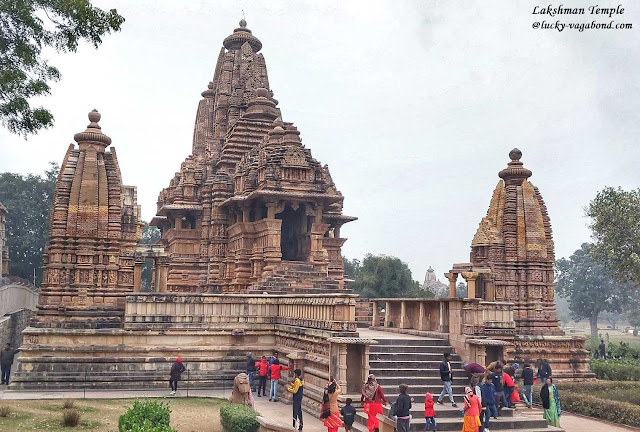Once in Khajuraho, the Western Group of Temples is the first spot to be visited by tourists. As soon as you enter the Western Group of Temples, the majestic architecture on the left-hand side which appears is the acclaimed “Lakshman Temple”.
Lakshman Temple was built in the year 930-950 AD by King Yasovarman of
Chandela dynasty. Dedicated to Lord Vishnu, the temple is built entirely of red sandstone
and has been constructed using tenon joints without any mortar, which is one of
the oldest blocks joining method. The temple rests on an elevated platform and a number of stairs have to
be climbed in order to reach the entrance.
Lord Vishnu in the 3-headed form, known as Vaikuntah Vishnu presides over this
temple. Central head is of human and other two heads are of Lion (Narsingh Avtar) and Boar (Varah Avtar). This is one of its kind statues and definitely worth visiting.
The unique feature of the temple is that the inner sanctum of Garbh-Griha where Lord Vishnu sits is a dark and windowless chamber. Lakshman
Temple is one of the prominent temples in Khajuraho, the inner sanctum was
designed for dedicated, intimate and undisturbed worship of Lord Vishnu.
Built in Nagara
architecture, this is also one of the oldest temples in Khajuraho and is
decorated with almost 600 images/ statues of Gods/ Goddesses. Likewise, this
portrait of Lord Narsingh killing demon Hiranyakashipu.
and wherever you see, magic of the sacred chisels is surely going to mesmerize.
Consisting of an entrance doorway, mandapa, maha-mandapa, antarala, garbhagriha, and parikrama marg, the temple has all elements of Hindu temple architecture. The architecture is a literature in Symmetry, Geometry, Engineering and whatever you can relate with Construction of such structures.
One can easily dedicate
1-2 hours here in appreciating the details. Temple caretakers and guards are benevolent enough to tell and share a few
details about the structure and carved images without expecting/ demanding anything. Check the grandiose from right side.
I asked one caretaker about the temple carvings to check his knowledge but to my surprise, he was factually correct. As a token of appreciation, I handed him ₹ 100, which he accepted very reluctantly. If you feel like, you may also give some money, may be ₹ 50 or ₹ 100.
The platform of the
temple is beautifully decorated with patterns of elephants and horsemen carrying out parade.
Apart from this, scenes of battles, hunting and processions are also engraved
on the borders of the platform of the temple.
The temple is about 30
meters long and approximately high in same proportion. Around the base is the
rows of elephant statues, probably depicted to carry the weight of the temple.
To summarize - This is not just
a temple constructed by arranging rocks, but a testimony to our rich culture. Visit here is not just a trip, but an emotion and a feeling to connect with our glorious history. Next temple in the list, at back side of Lakshman Temple is none other than the grand "Kandariya Mahadev Temple".
Keep exploring Folks.








